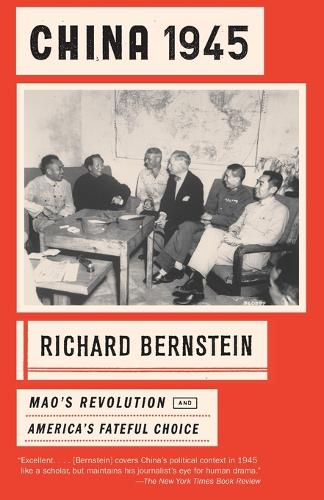
China 1945: Mao's Revolution and America's Fateful Choice
(Paperback)
Publishing Details
China 1945: Mao's Revolution and America's Fateful Choice
By (Author) Richard Bernstein
Alfred A. Knopf
Alfred A. Knopf
15th November 2015
United States
Classifications
General
Non Fiction
951.042
Physical Properties
Paperback
464
Width 133mm, Height 203mm, Spine 28mm
401g
Description
At the beginning of 1945, relations between America and the Chinese Communists couldn't have been closer. Chinese leaders talked of America helping to lift China out of poverty; Mao Zedong himself held friendly meetings with U.S. emissaries. By year's end, Chinese Communist soldiers were setting ambushes for American marines; official cordiality had been replaced by chilly hostility and distrust, a pattern which would continue for a quarter century, with the devastating wars in Korea and Vietnam among the consequences. In China 1945, Richard Bernstein tells the incredible story of the sea change that took place during that year-brilliantly analyzing its far-reaching components and colorful characters, from diplomats John Paton Davies and John Stewart Service to Timejournalist, Henry Luce; in addition to Mao and his intractable counterpart, Chiang Kai-shek, and the indispensable Zhou Enlai. A tour de force of narrative history,China 1945examines American power coming face-to-face with a formidable Asian revolutionary movement, and challenges familiar assumptions about the origins of modern Sino-American relations.
Reviews
Excellent. . . . [Bernstein] covers Chinas political context in 1945 like a scholar, but maintains his journalists eye for human drama.
The New York Times Book Review
An important book. . . . a cautionary tale at a time when the United States confronts a resurgent China, and its communist leaders, across the Pacific Ocean and wonders again if they can be believed.
The Washington Post
If you read only one book on this crucial period, Mr. Bernsteins work should be it.
The Washington Times
Skillfully crafted. . . . Bernstein is a talented storyteller. . . . Provides a rich account of just how far the Communist leaders went in wooing, and misleading, the Americans.
The Wall Street Journal
Elegant and compelling. . . . This thoughtful book moves decisively beyond sterile old debates to demonstrate that in the end, Chinas fate in 1945 was for the Chinese people, and not Americans, to decide.
Foreign Affairs
Authoritative and engaging.
NPR
Extensively researched. . . .[Bernsteins] findings about the limits of US influence in China are relevant to more recent American interventions in Iraq and Afghanistan.
The Christian Science Monitor
A fascinating, sometimes harrowing account of an uncertain periodpointedly relevant to todays global dilemmas as well.
Richmond Times-Dispatch
A rich, compelling book told with subtlety and grace. For those interested in understanding how China went Communist in the middle of the 20th century, it is well worth the read.
David Sibley, Military History Quarterly
Stimulating. . . .A timely analysis that sheds light on the realities of American engagement in Asia.
Publishers Weekly
Thoroughly researched and well-argued. . . .highly recommended.
Library Journal
Immensely readable. . . .A nuanced hindsight assessment that expertly pursues the historical ramification of roads not taken.
Kirkus
Cogent and engaging.
Booklist
The current rivalry between the United States and China for the dominant role in East Asia is rooted in a complicated history dating back to 1945. Richard Bernsteins compelling and moving examination of U.S.-China relations during and immediately after World War II sparkles with fresh insights into the tragic events and colorful personalities of that era. A model of historical writing for non-specialist readers, its only fault is that once begun it is almost impossible to put down.
Steven I. Levine, co-author of Mao: The Real Story
The dramatic events of 1945 continue to shape American relations with China. Mao, Zhou Enlai, Stilwell, General George Marshallthese and other giant personalities come to life in these pages, as we relive the fateful choices events forced on them in a year of nonstop crises. The book offers a thoughtful examination of the roots of authoritarianism in China, the sources of Chinese-American mistrust, and the intractability of history.
Andrew J. Nathan, co-author of The Tiananmen Papers
Richard Bernsteins China 1945 is the rare book that under-promises on its title. The author goes far beyond delivering up that pivotal year, providing instead a learned and compelling narrative of the characters and forces that drove China and the United States apart and created todays world.
Howard French, author of Chinas Second Continent
At the beginning of 1945, America had the chance to forge a good relationship with Mao and his Chinese communist rebels. Richard Bernsteins fascinating and important tale of what happened provides crucial lessons about creative diplomacy that are still very relevant, both in dealing with China and around the world.
Walter Isaacson, author of Steve Jobs
At a time when the United States and China are groping for a new model of great power relations, Richard Bernsteins stimulating and informative book casts essential light on the era that led to todays challenge. China 1945 makes us more aware than ever of the hideous complexities of American involvement in East Asia, the importance of history and the limited perspectives of those who make fateful choices.
Jerome A. Cohen, co-director, NYUs US-Asia Law Institute; adjunct senior fellow for Asia, Council on Foreign Relations
Author Bio
Richard Bernstein has been a reporter, culture critic, and commentator for more than thirty years. He was a foreign correspondent in Asia and Europe forTimemagazine andThe New York Times, and was the first Beijing bureau chief forTime. He is the author of many books on Chinese and Asian themes, among themThe Coming Conflict with ChinaandUltimate Journey, the latter of which was a New York TimesBest Book of the Year. He is also the author ofOut of the Blue- A Narrative of September 11, 2001, which was named byThe Boston Globeas one of the seven best books of 2002. He lives in New York. richardbernstein.net @R_Bernstein
